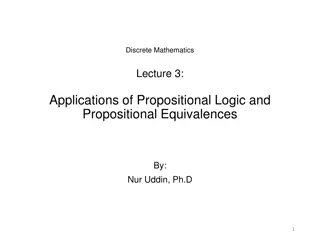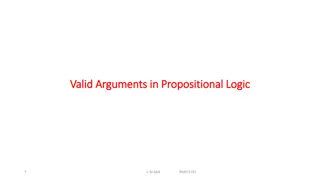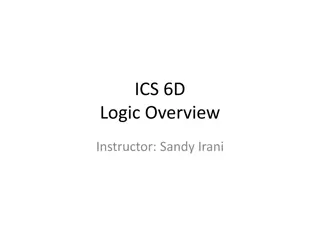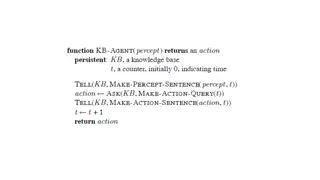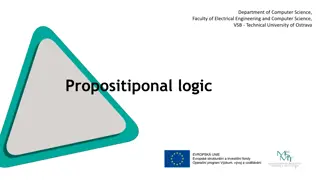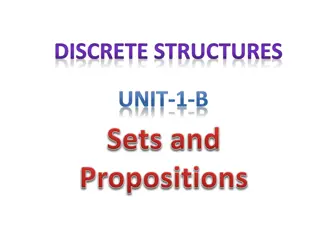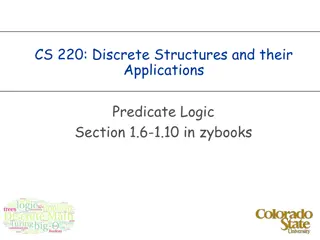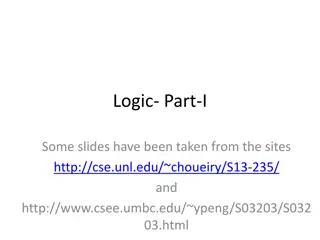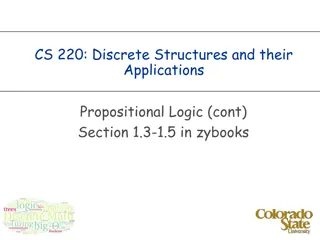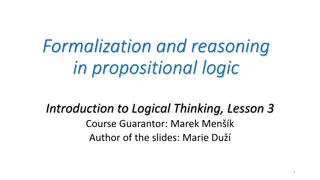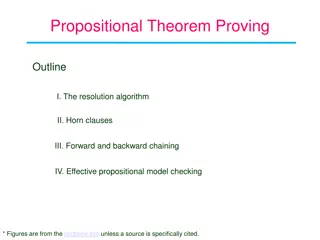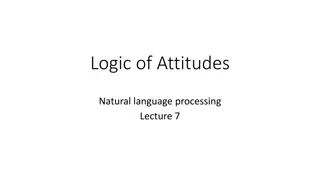Understanding Propositional Logic Concepts
Explore different facets of propositional logic, including conditional statements, logic operators, logical equivalence, contrapositives, and proofs. Delve into the intricacies of if-then statements, logical negations, and the nuances of if, only-if conditions. Enhance your understanding of propositional logic through various examples and explanations.
Uploaded on Sep 12, 2024 | 0 Views
Download Presentation

Please find below an Image/Link to download the presentation.
The content on the website is provided AS IS for your information and personal use only. It may not be sold, licensed, or shared on other websites without obtaining consent from the author. Download presentation by click this link. If you encounter any issues during the download, it is possible that the publisher has removed the file from their server.
E N D
Presentation Transcript
Conditional Statement If p then q p is called the hypothesis; q is called the conclusion The department says: If your GPA is 4.0, then you don t need to pay tuition fee. When is the above sentence false? It is false when your GPA is 4.0 but you still have to pay tuition fee. But it is not false if your GPA is below 4.0. Another example: If there is a bandh today, then there is no class. When is the above sentence false?
Logic Operator ::= IMPLIES P Q P Q T T T T F F F T T F F T Convention: if we don t say anything wrong, then it is not false, and thus true.
Logical Equivalence If you see a question in the above form, there are usually 3 ways to deal with it. (1) Truth table (2)Use logical rules (3)Intuition
If-Then as Or P Q P Q Idea 2: Look at the false rows, negate and take the and . T T T T F F F T T F F T If you don t give me all your money, then I will kill you. Either you give me all your money or I will kill you (or both). If you talk to her, then you can never talk to me. Either you don t talk to her or you can never talk to me (or both).
Negation of If-Then If your GPA is 4.0, then you don t need to pay tuition fee. Your term GPA is 4.0 and you still need to pay tuition fee. If my computer is not working, then I cannot finish my homework. My computer is not working but I can finish my homework. previous slide DeMorgan
Contrapositive The contrapositive of if p then q is if ~q then ~p . Statement: If you are a CS year 1 student, then you are taking CTS002. Contrapositive: If you are not taking CTS002, then you are not a CS year 1 student. Statement: If x2is an even number, then x is an even number. Contrapositive: If x is an odd number, then x2is an odd number. Fact: A conditional statement is logically equivalent to its contrapositive.
Proofs Statement: If P, then Q Contrapositive: If Q, then P. T T T F F T T F F T F T T F F T F T F F T T T T
If, Only-If You will succeed if you work hand. You will succeed only if you work hard. R if S means if S then R or equivalently S implies R We also say S is a sufficient condition for R. R only if S means if R then S or equivalently R implies S We also say S is a necessary condition for R. You will succeed if and only if you work hard. P if and only if (iff) Q means P and Q are logically equivalent. That is, P implies Q and Q implies P.
Math vs English Parent: if you don t clean your room, then you can t watch a DVD. C D This sentence says So In real life it also means Mathematician: if a number x greater than 2 is not an odd number, then x is not a prime number. This sentence says But of course it doesn t mean
Necessary, Sufficient Condition Mathematician: if a number x greater than 2 is not an odd number, then x is not a prime number. This sentence says But of course it doesn t mean Being an odd number > 2 is a necessary condition for this number to be prime. Being a prime number > 2 is a sufficient condition for this number to be odd.
Necessary AND Sufficient Condition ::= IFF P Q P Q T T T T F F F T F F F T Note: P Q is equivalent to (P Q) (Q P) Note: P Q is equivalent to (P Q) ( P Q) Is the statement x is an even number if and only if x2is an even number true?
Argument An argument is a sequence of statements. All statements but the final one are called assumptions or hypothesis. The final statement is called the conclusion. An argument is valid if: whenever all the assumptions are true, then the conclusion is true. If today is Wednesday, then yesterday was Tuesday. Today is Wednesday. Yesterday was Tuesday.
Modus Ponens If p then q. p q If bandh, then class cancelled. Bandh. Class cancelled. assumptions conclusion p T T F F q T F T F p q T F T T p T T F F q T F T F Modus ponens is Latin for method of affirming .
Modus Tollens If p then q. ~q ~p If Bandh, then class cancelled. Class not cancelled. No Bandh. assumptions conclusion p T T F F q T F T F p q T F T T ~q F T F T ~p F F T T Modus tollens is Latin for method of denying .
Equivalence A student is trying to prove that propositions P, Q, and R are all true. She proceeds as follows. First, she proves three facts: P implies Q Q implies R R implies P. Then she concludes, ``Thus P, Q, and R are all true.'' Proposed argument: assumption ( ), ( ), ( R ) P Q Q R R P Is it valid? P Q conclusion
Valid Argument? ( ), ( ), ( R ) P Q Q R R P Is it valid? P Q assumptions conclusion P T T T T F F F F Q R T T F F T T F F OK? yes yes yes yes yes yes yes no T F T F T F T F T T F F T T T T T F T T T F T T T T T T F T F T T F F F F F F F To prove an argument is not valid, we just need to find a counterexample.
Valid Arguments? assumptions conclusion p T T F F q T F T F p q T F T T q T F T F p T T F F If p then q. q p Assumptions are true, but not the conclusion. If you are a fish, then you drink water. You drink water. You are a fish.
Valid Arguments? assumptions conclusion p T T F F q T F T F p q T F T T ~p F F T T ~q F T F T If p then q. ~p ~q If you are a fish, then you drink water. You are not a fish. You do not drink water.
More Exercises Valid argument True conclusion True conclusion Valid argument
Contradiction If you can show that the assumption that the statement p is false leads logically to a contradiction, then you can conclude that p is true. You are wearing a jacket. If it was warm, then you would not have worn a jacket. It is not warm.
Knights and Knaves Knights always tell the truth. Knaves always lie. A says: B is a knight. B says: A and I are of opposite type. Suppose A is a knight. Then B is a knight (because what A says is true). Then A is a knave (because what B says is true) A contradiction. So A must be a knave. So B must be a knave (because what A says is false).
Quick Summary Conditional Statements The meaning of IF and its logical forms Contrapositive If, only if, if and only if Arguments definition of a valid argument method of affirming, denying, contradiction Key points: (1) Make sure you understand conditional statements and contrapositive. (2)Make sure you can check whether an argument is valid.
Which is true? Which is false? The sentence below is false. The sentence above is true.







